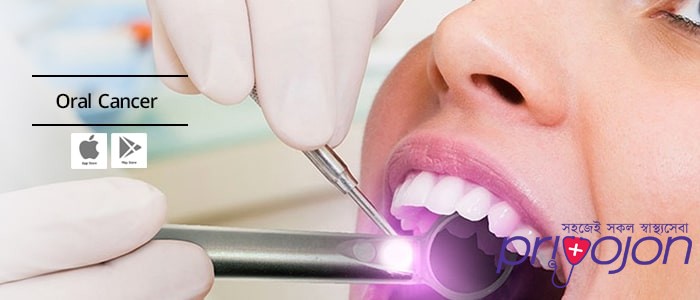
Overview
Medically reviewed by Dr. Rabeya Afroz Shomi
What is the treatment?
Oral cancer is defined as the abnormal growth of cells in any part of the lips or mouth. Most oral cancers are known to commence in the lips or mouth lining. This is the region where we find the flat cells also known as the squamous cells. Other names for this type of cancer are oropharyngeal cancer and oral cavity cancer. There is a wide range of risk factors associated with oral cancer. This involves heavy alcohol consumption, smoking, having human papillomavirus (HPV), or marijuana usage. In case of lip cancer, exposure to UV light or tanning beds increases the risk for oral cancer. Symptoms include lumps or sores on the mouth region or the lips.
The diagnosis begins with the doctor conducting an oral screening exam as part of your routine dental exam. In specific terms, your dentist will try to find out the irregular changes of tissues in your oral cavity, neck, face, and head, or feel for lumps at the same areas. During the oral examination, he will look for discoloured tissues or sores. You may also require a biopsy to determine any suspicious looking areas. The treatment methods available for oral cancer are the same as any other cancers. Firstly, it involves a surgery to remove the cancerous growth of cells, followed by a chemotherapy or radiation therapy to fully remove the remaining cancerous cells.
How is the treatment done?
After proper consultation with your doctor, you will be guided towards a specialist like an otolaryngologist, maxillofacial surgeon, plastic surgeon, radiation oncologist, and medical oncologist to treat this disease. These people specialize in surgery, radiation therapy and chemotherapy related to mouth cancer. Other health care professional include a speech pathologist, dentist, mental health counselor, and nutritionist.
Surgical treatment for the removal of cancerous cells is the most common treatment for oral cancer. At times, the surgeon removes the lymph nodes and other tissues from the neck as well. Patients may also have a combination treatment of surgery along with radiation therapy. Radiation therapy or radiotherapy is a kind of local therapy which affects the treated area only. It is used alone for patients who are unable to afford surgery or for treating small tumors. In some cases it is done before surgery to shrink the tumor by killing cancer cells. In order to treat oral cancer there are two types of radiation treatment used. These are external and internal radiation (implant radiation). External radiation comes from a machine and internal radiation comes from radioactive materials put in thin plastic and needles which are directly placed in the tissue. Chemotherapy is the usage of anticancer drugs to destroy cancer cells. This systematic therapy is associated with the drugs to enter the bloodstream and affect the cancerous cells throughout the body. It is usually given by injection.
Who is eligible for the treatment? (When is the treatment done?)
A patient who has a small tumor or is unable to tolerate or afford surgery is eligible for radiation therapy. Someone with locally advanced disease is eligible for surgery.
Who is not eligible for the treatment?
A patient who is older than 75 years is not eligible for the treatment. Also, pregnant women are not eligible.
Are there any side effects?
Side effects of the treatment include soreness, pain or redness in the mouth and throat, loss of senses of taste, hoarseness, and skin colour change on the head and neck as tanned or sunburns which eventually fades away.
What are the post-treatment guidelines?
It is very important that the patient receives proper follow-up care after the treatment. Even if it seems that the cancer has been completely destroyed or removed, the disease has a tendency to return because of the undetected cancerous cells remaining in the body. Recurrence of cancer cells is regularly monitored by the doctor. Your doctor will recommend you to keep investigating your mouth and come for screening exams regularly. He may do a blood test, x-rays or a complete physical examination. Doctors also urge you to strictly stop the usage of tobacco and consumption of alcohol to prevent recurrence of oral cancer.
How long does it take to recover?
It may take more than a year depending upon the severity of the disease. Side effects may still remain.
Are the results of the treatment permanent?
No the results of the treatment for oral cancer are not permanent as the cancer cells can return in case they were not detected earlier.
What are the alternatives to the treatment?
Alternative treatments for oral cancer include using herbs like turmeric (curcuma longa), mint, thyme, basil and green tea. The usage of these herbs will provide benefit in easing the symptoms associated with oral cancer.
